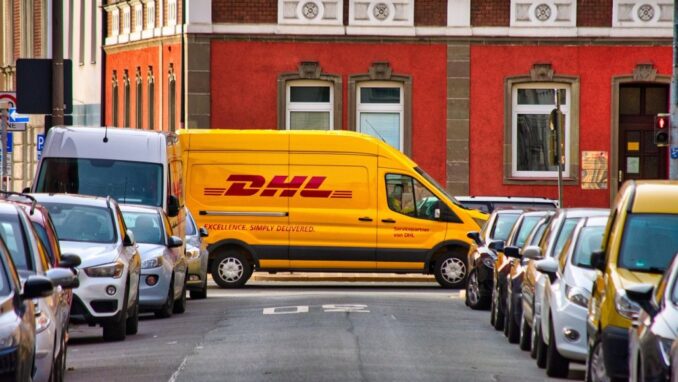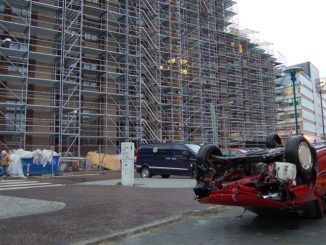
“Ok, how do you actually deliver 300 parcels at Christmas, Matt? You spouted out a lot of words and made me wait for part 2, but how do you actually do it?”
Well, just before I get into it, technology has drastically changed the business. Many of you of a certain age will recall scribbling a signature on a dog-eared sheet of A4 attached to a clipboard. You were happy to get the parcel when you were in, as you never knew what day it was coming, let alone the hour. Not only these days do you get an ETA window of an hour, but some companies allow the customer to track where the driver is on a map and how many drops away they are. The last ten years have seen changes for the courier also. Quickly moving from bulky PDA devices to apps on phones. Moving away from signatures as proof of delivery to photos and pinpoint map locations.
Delivering a humongous volume of 300 parcels at Christmas, also referred to as peak, are really only possible if you deliver for Evri or Amazon as most of the parcels will be small and you’ll have many drops with multiple parcels. Also, the areas you’ll be delivering to will be small, so therefore less time between each drop. Even then you will have to do it without a single break. You will be sipping a drink and taking a bite from a sandwich between each stop.
It is highly unlikely you will be able to get that many boxes of the size DPD and DHL deliver even in a LWB Mercedes Sprinter. Additionally, the big box guys have rounds that are much larger in square miles; you simply would run out of time. However, no matter how many parcels you are delivering, preparation is everything. If you scan and chuck the parcels in your vehicle without any forethought, you can crash and burn very easily once you have started your round. Many inexperienced couriers can start to panic and sweat, feel completely overwhelmed by the situation, and crap themselves when they see the jumbled mess of a hundred plus parcels, wondering if they will ever finish.
First, I empty my crate and separate the parcels on the floor into four areas. I then start scanning each parcel into the van in reverse order. Loading up correctly is crucial in doing high volumes, not only to keep order in the chaos but to make it easy to find each parcel when it comes to delivering it. If it takes more than 10-20 seconds to get the parcels you need at each stop, then you have loaded up wrongly. Amazon works differently in that you don’t need to scan all the parcels, and they all come in sacks. While having the parcels in sacks makes it quicker to load up, you’ll lose all that time and more later on trying to find the right parcel. I’ve seen many an Amazon driver parked up sorting out their parcels.
Once I have loaded up, I finalise my route, set the ETAs, and off I go. Currently, across both of my rounds, my average amount of parcels is 180 per day, and my first drop is usually 15-20 mins from the depot. The amount of concentration required from start to finish is absolute, not only on driving but also other things like where and how I will park once I reach my drop. Sometimes all the easy places have gone, and it is about finding the least worst place and trying not to pee any of the locals off. Then you have to think about the next drop, so parking in a way that means you don’t have to reverse or turn around is a bonus. Any manoeuvres require complete vigilance for cars, pedestrians, bikes, bins, and animals, so losing concentration will end in a prang or worse.
After parking, I collect all the parcels I need from the rear. It might be many for the same place or they are for different houses but all within walking distance. I knock and ring the bell, and if they have a modern video doorbell, I ring that. You’d be surprised or not to hear many don’t answer these newfangled bells. “Hello, delivery,” “Hi, thank you.” I then take a picture of the delivery, either with it in my hand or on the doorstep. “Ok, thank you,” I say as I hand them their order. I turn and walk away, already thinking about the next drop.
So what if the customer is not in and they don’t answer their fancy doorbell? You hope that the customer has nominated a safe place or a neighbour. They can also ask for it diverted to a locker or a parcel shop. If there is no accessible safe place like a porch, garage, shed or back door, then well the correct answer is to try the neighbours but as I’ve done the rounds for so long my regulars are happy for me to put things behind bins or in an outside cupboard and on a new build estate I do, the houses have deep gas meter boxes which are the perfect size to hide the smaller parcels in.
Sometimes there are no safe places, even behind bins, and there are no neighbours. At this point, the parcel is carried forward for the next day. Sadly, there is a small minority of customers who do not help the couriers one iota; they order things without thinking about how it will be successfully delivered. They are always at work, they lock the porch and the back gate, there is nothing to hide them in or behind, and the neighbours are never in either. Thankfully rare, but another thing some do is order a load of stuff, maybe while half drunk, completely forget about it, and then go on holiday.
Delivering to people’s rural homes is another learning experience, like knowing which door to knock, whether they don’t mind parcels left by the door, knowing the buzzer doesn’t work or they don’t have one, so having to put things through the gate at the end of their long driveway. Knowing that the tree which blew over and blocked the road still hasn’t been cleared, so you have to completely change your route and drop the order. Until you know every house and business on your patch, it is not possible, in my opinion, to give a service at the level required by customers. And when I say know, I don’t just mean you know where they are, although that helps, of course, particularly in rural areas, and the mapping software wants you to drive across a field of sheep. No, I mean learning all the idiosyncrasies of every place you deliver to. For example, I know a rural car workshop I deliver to is only open half the time, so I need to put the parcels in a makeshift utility room at the end of the barn. Another office I know is only open Tuesdays to Thursdays with nowhere safe to put anything, so I know on the other days to leave their parcels at the depot. In a farm with multiple properties and limited access, the parcels need to be put in the box by the gate.
Human nature being what it is, means you will eventually encounter a Karen. It was the Christmas rush and I came to this particular house about 5 p.m. So dark but not late. I knocked and knocked and knocked, the lady eventually answered, “Delivery”, I said chirpily. She let out a big sigh and snapped, “Why can’t you come early like Royal Mail”, as I lifted the box into her doorway. “I’m sorry it’s Christ…”, before I could finish, she started ranting away. I kept trying to get word in edgeways to no avail.
Probably the most awkward situation you will come across delivering is the domestic row. A few years back, I parked up outside this house I was about to deliver to and immediately heard the occupants having an absolutely barney. I was just about to get out of my van when the guy had had enough and stormed out of the door with his bike. The lass fired out as he was walking down the path, “Your dick smells anyway.” After computing that eye-opening experience, I decided to carry the parcel forward and come back the next day.
Dogs are another occupational hazard. While I have been bitten, nabbed, barked at, and lunged at, thankfully nothing has required me to visit the local A&E. Again, the long-term knowledge of knowing your round is crucial. Knowing which homes have dogs, and knowing how each owner deals with their dogs, and getting to know the dogs themselves will help keep you safe. When you do learn that a particular hound or hounds are friendly, then it makes for such a happy, memorable experience for you and your customers. When I’m fussing a mutt, I always hear, “Every courier that comes here runs away as soon as they see my dog.”
You might have noticed by this point, across both parts, I haven’t mentioned the word. The word that can make you come out in a cold sweat. The word that can and will steal your money and give it to someone more equal than you. I think you know what it is but I’ll leave that subject for another time.
The job might not require the IQ of Einstein, but it does require all of your mental bandwidth, if that makes sense. Making customers happy, a service with a smile, requires a lot of care and professionalism for every single parcel you deliver. If football players and managers are only as good as their last game, then couriers are only as good as their last delivery.
© 2025 Mattg820



